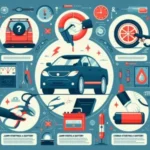Owning a car is a significant investment, and maintaining its health is crucial to ensure longevity and reliability on the road.
Unfortunately, many drivers find themselves facing unexpected breakdowns and costly repairs due to common car problems that could have been easily prevented. From engine troubles and brake issues to battery failures and tire blowouts, these challenges can disrupt your routine and lead to stress and frustration. But fear not! With a little proactive care and attention, you can safeguard your vehicle against these pitfalls. In this blog post, we’ll explore essential tips and tricks to keep your car running smoothly, helping you save time, money, and the hassle of emergency repairs. Whether you’re a seasoned car enthusiast or a first-time owner, these practical strategies will empower you to take charge of your vehicle’s maintenance and enjoy peace of mind on every drive.
1. Understanding the Importance of Preventive Maintenance

Preventive maintenance is more than just a buzzword; it’s a fundamental practice that can save you time, money, and stress in the long run. Much like a regular check-up at the doctor’s office, routine maintenance for your vehicle is essential in identifying potential issues before they escalate into costly repairs. Understanding the importance of preventive maintenance means recognizing that your car is a complex machine that requires consistent care to function optimally.
Imagine cruising down the highway, the sun shining, music playing, and then suddenly—your engine sputters, or worse, it overheats. These scenarios can often be traced back to neglecting those crucial maintenance checks. Regular oil changes, tire rotations, brake inspections, and fluid level assessments can significantly enhance your vehicle’s performance and lifespan. By adhering to your manufacturer’s recommended service schedule, you not only ensure that your car runs smoothly, but you also maintain its resale value.
In addition to keeping your vehicle in prime condition, preventive maintenance helps improve safety on the road. Faulty brakes, worn-out tires, or malfunctioning lights can create dangerous situations for you and other drivers. By taking proactive steps to address these issues, you provide peace of mind for yourself and your passengers.
Ultimately, preventive maintenance is an investment in your vehicle’s health. It fosters a routine that can help you catch minor issues before they spiral into major problems, allowing you to enjoy your driving experience worry-free. So, take the time to understand its importance—your car (and your wallet) will thank you.
2. Regularly Check Your Oil Levels
Regularly checking your oil levels is one of the simplest yet most crucial maintenance tasks you can perform to ensure the longevity and efficiency of your vehicle. Oil serves as the lifeblood of your engine, lubricating its moving parts and preventing excessive wear and tear. Over time, oil can become contaminated with dirt and debris or simply diminish in quantity, leading to inadequate lubrication. This can result in catastrophic engine damage and costly repairs.
To make this task a habit, set a reminder to check your oil levels at least once a month or before long trips. Start by parking your vehicle on a level surface and allowing the engine to cool down. After a few minutes, pop the hood and locate the dipstick—usually marked with a bright color for easy identification. Pull it out, wipe it clean with a cloth, and reinsert it to get an accurate reading. The oil should ideally be between the two markings on the dipstick. If it’s low, it’s time to top it off with the appropriate type of oil recommended in your owner’s manual.
Additionally, pay attention to the color and consistency of the oil. Fresh oil is typically a clear amber color, while dark, gritty, or milky oil can signal problems that may require further investigation. If you notice any unusual changes or if the oil appears to be low frequently, it might be worth consulting a professional to check for leaks or other underlying issues.
Incorporating regular oil checks into your vehicle maintenance routine not only helps prevent engine problems but also promotes better fuel efficiency, smoother performance, and ultimately extends the life of your car. Remember, a few minutes spent checking your oil can save you from significant headaches down the road—both literally and figuratively!
3. Monitor Tire Health and Pressure

Monitoring tire health and pressure is an essential yet often overlooked aspect of car maintenance that can save you from a multitude of common problems down the road. Your tires are the only contact between your vehicle and the road, and their condition can significantly affect not only your car’s performance but also your safety.
Start by regularly checking the tire pressure, as it can fluctuate with changes in temperature and over time. Under-inflated tires can lead to poor fuel efficiency, increased tire wear, and a greater risk of blowouts. On the other hand, over-inflated tires can reduce traction and affect your vehicle’s handling. Keeping a reliable tire pressure gauge in your glove compartment can make this task simple and efficient. Aim to check your tire pressure at least once a month, and don’t forget to include your spare tire in this routine.
Equally important is the inspection of your tires for signs of wear and damage. Look for uneven tread wear, cracks, or bulges on the sidewalls, and check for any embedded objects like nails or stones. A simple tread depth test—using a penny or a dedicated tread depth gauge—can help you assess whether your tires need replacing. The rule of thumb is that if you can see the tops of Lincoln’s head when inserting a penny into the tread, it’s time to shop for new tires.
Additionally, consider rotating your tires every 5,000 to 7,000 miles. This practice ensures even wear across all tires, prolonging their lifespan and enhancing your vehicle’s handling and performance. Keeping your tires in optimal condition not only promotes a smoother ride but also contributes to better fuel economy and overall vehicle safety. By being proactive about tire health and pressure, you can prevent common car problems before they happen, ensuring a safer and more enjoyable driving experience.
4. The Role of Fluid Levels in Car Functionality
Maintaining proper fluid levels is one of the simplest yet most crucial aspects of car care that can significantly impact your vehicle’s performance and longevity. Think of your car as a finely tuned machine where each component relies on a specific fluid to function optimally. From engine oil to coolant, transmission fluid to brake fluid, each type plays a vital role in ensuring that your car operates smoothly and efficiently.
Engine oil, for instance, acts as the lifeblood of your engine, lubricating moving parts to prevent friction and wear. Low oil levels can lead to inadequate lubrication, resulting in increased engine temperature and potential damage. Regularly checking and changing your engine oil according to your manufacturer’s recommendations can save you from costly repairs down the road.
Coolant, on the other hand, is essential for regulating your engine’s temperature. A low coolant level can cause your engine to overheat, leading to severe engine damage. It’s important to inspect your coolant reservoir periodically, especially before long trips or during extreme weather conditions.
Transmission fluid is another critical player, responsible for ensuring smooth gear shifts. If your transmission fluid is low or dirty, you may experience slipping gears or harsh shifting, which can compromise the overall functionality of your vehicle. Regularly checking and replacing your transmission fluid can help maintain seamless performance.
Don’t overlook brake fluid either; it’s vital for your safety. Low brake fluid levels can lead to reduced braking efficiency, putting you and others on the road at risk. Always ensure your brake fluid is at the recommended level and check for any signs of leaks.
In summary, taking the time to monitor your car’s fluid levels is an investment in its health and your safety. Establish a regular maintenance routine that includes fluid checks, and you’ll be well on your way to preventing common car problems before they arise. By being proactive, you’ll not only enhance your car’s performance but also extend its lifespan, leading to a more reliable and enjoyable driving experience.
5. Keeping Your Battery in Good Condition

Keeping your battery in good condition is crucial for ensuring your vehicle starts reliably and runs smoothly. A healthy battery not only powers your engine but also supports all the electrical components in your car, from headlights to infotainment systems. Here are some essential practices to maintain your battery and extend its lifespan.
First, regularly check the battery terminals for corrosion, which can appear as a white, powdery substance. Corrosion can hinder the flow of electricity and lead to starting issues. If you notice any buildup, clean the terminals with a mixture of baking soda and water, scrubbing gently with a brush. This simple maintenance task can significantly improve your battery’s performance.
Next, ensure that the battery is securely mounted in its tray. Vibration from driving can cause internal damage to the battery, leading to premature failure. If you notice any looseness, tighten the hold-downs to keep the battery stable.
Temperature plays a significant role in battery health. Extreme heat can evaporate battery fluid, while severe cold can reduce its capacity. During the summer months, park in shaded areas or garages whenever possible, and in winter, consider using a battery blanket to maintain optimal temperatures.
Finally, it’s wise to have your battery tested regularly, especially if it’s over three years old. Many auto parts stores offer free battery testing, which can provide you with information about its charge level and overall health. If your battery is showing signs of weakness, replacing it before it fails can save you from being stranded.
By following these simple yet effective tips, you can keep your battery in top shape, ensuring your car starts when you need it and minimizing the risk of unexpected breakdowns. Regular attention to your battery can lead to a more reliable driving experience and help prevent common car problems before they arise.
6. Importance of Brake Inspections
When it comes to vehicle safety, one of the most critical components to monitor is your brakes. Brake inspections are not just a routine check; they’re an essential part of vehicle maintenance that can prevent catastrophic accidents and costly repairs down the line. Your brakes are responsible for slowing down or stopping your vehicle, and even the slightest issue can have serious consequences.
Regular brake inspections help identify problems before they escalate. During an inspection, a qualified technician will check the brake pads, rotors, and fluid levels, looking for signs of wear or damage. Worn-out brake pads can lead to reduced stopping power and increased stopping distances, which is particularly dangerous in emergency situations. Moreover, neglecting to check the brake fluid can lead to air bubbles in the brake lines, resulting in a spongy pedal feel and compromised braking performance.
In addition to safety, proactive brake inspections can save you money in the long run. Addressing minor issues before they develop into major repairs can extend the lifespan of your braking system and help you avoid emergency service costs. For instance, replacing brake pads is significantly less expensive than having to replace damaged rotors or calipers due to neglect.
To ensure that your brakes are always in top condition, aim to have them inspected at least once a year or every 12,000 miles, whichever comes first. However, if you notice any unusual noises, vibrations, or changes in braking performance, don’t wait for your scheduled inspection—take your vehicle in immediately. By prioritizing regular brake inspections, you’re not just maintaining your car; you’re investing in your safety and peace of mind on the road.
7. How to Maintain Your Cooling System

Maintaining your vehicle’s cooling system is crucial for preventing overheating and ensuring that your engine operates at optimal temperatures. A well-functioning cooling system not only extends the life of your engine but also enhances fuel efficiency and overall vehicle performance. Here are some essential tips to keep your cooling system in top shape.
First and foremost, regularly check the coolant level. Your engine relies on a proper balance of coolant and water to regulate its temperature. Make it a habit to inspect the coolant reservoir at least once a month, especially before long trips. If you notice that the coolant is low, top it up with a mixture of antifreeze and water, following the manufacturer’s recommendations for your specific vehicle.
Next, pay attention to the condition of your coolant. Over time, coolant can become contaminated with rust, debris, and other harmful substances. If it appears dirty or discolored, it might be time for a coolant flush. This process involves draining the old coolant and replacing it with fresh fluid, ensuring that your cooling system operates efficiently.
Additionally, inspect the radiator and hoses for any signs of wear or damage. Look for cracks, leaks, or bulges in the hoses, as these can lead to coolant loss and overheating. If you find any issues, replace the affected parts promptly. It’s also a good idea to clean the radiator fins, as dirt and debris can impede airflow, reducing its efficiency.
Don’t forget to check the thermostat as well. A malfunctioning thermostat can cause your engine to run too hot or too cold. If you notice any changes in your engine’s temperature gauge or experience fluctuating temperatures, consider having the thermostat tested and replaced if necessary.
Lastly, ensure that your vehicle’s water pump is functioning properly. This component is essential for circulating coolant throughout the engine. Listen for any unusual noises that might indicate a failing pump, and keep an eye out for coolant leaks under your vehicle. If you suspect an issue, it’s best to consult a professional mechanic.
By following these tips and incorporating regular maintenance into your car care routine, you can significantly reduce the risk of cooling system failures and enjoy peace of mind on the road. Remember, a little preventive care goes a long way in extending the lifespan of your vehicle and keeping it running smoothly.
8. Regularly Inspect Worn Belts and Hoses
Regularly inspecting worn belts and hoses is a crucial aspect of vehicle maintenance that can save you from unexpected breakdowns and costly repairs. Over time, the rubber in belts and hoses can degrade due to heat, friction, and exposure to various elements, leading to cracks, fraying, or even complete failure. These components play essential roles in your vehicle’s operation, from powering the alternator to circulating coolant, and neglecting them can result in significant issues down the road.
To stay ahead of potential problems, make it a habit to visually check your belts and hoses every few months. Look for signs of wear such as cracks, splits, or discoloration. If you notice any irregularities or if they feel brittle to the touch, it’s time to replace them. Pay special attention to high-stress areas, like the serpentine belt, which can wear out more quickly due to its continuous operation.
Don’t forget to inspect the connections as well. Hoses can develop leaks at their junction points, which can lead to fluid loss and overheating. Ensure that the clamps are tight and that there are no signs of coolant or oil seeping from the connections.
For extra peace of mind, consider scheduling a professional inspection during routine maintenance services. A trained mechanic can identify issues that may go unnoticed and advise on when to replace belts and hoses before they become a problem. By being proactive in your inspections, you not only extend the life of your vehicle but also ensure a smoother, more reliable driving experience.
9. The Benefits of Cleaning Your Fuel System
Keeping your fuel system clean is one of the most crucial yet often overlooked aspects of vehicle maintenance. A well-maintained fuel system ensures that your engine runs smoothly and efficiently, providing you with optimal performance and fuel economy. Over time, however, deposits and contaminants can build up in your fuel lines, injectors, and filters, leading to a host of problems that can hinder your car’s performance and lifespan.
Regularly cleaning your fuel system can prevent these issues from occurring. For starters, it helps to eliminate carbon buildup and other residues that can cause misfires, reduced power, and even stalling. When your fuel injectors are clean, they spray a fine mist of fuel into the combustion chamber, which promotes better combustion and improves your vehicle’s overall efficiency. This not only leads to a smoother ride but also enhances your gas mileage, saving you money at the pump.
Moreover, a clean fuel system reduces the risk of engine knocking and pinging, which can lead to costly repairs if not addressed in time. By maintaining your fuel system, you’re not just preventing immediate issues; you’re also extending the life of your engine and other vital components. This proactive approach can save you considerable time and expense in the long run.
Incorporating a fuel system cleaning into your regular maintenance schedule is a simple yet effective way to bolster your car’s performance. Whether you choose to do it yourself with fuel additives or opt for professional cleaning services, the benefits are clear: a cleaner fuel system translates to a healthier engine and a more enjoyable driving experience. So don’t wait until you experience a problem—take the initiative to keep your fuel system in top shape and enjoy the peace of mind that comes with it.
10. Scheduling Routine Tune-Ups
Scheduling routine tune-ups is one of the most effective strategies to prevent common car problems before they escalate into costly repairs. Just like regular check-ups are essential for maintaining your health, tune-ups are vital for ensuring your vehicle runs smoothly and efficiently. These preventive maintenance appointments typically involve a comprehensive inspection of critical components, including the engine, brakes, tires, and fluid levels.
During a routine tune-up, a certified mechanic will check the condition of your spark plugs, replace air and fuel filters, and inspect belts and hoses for wear and tear. This proactive approach not only helps identify potential issues early but also optimizes your car’s performance, enhancing fuel efficiency and extending the lifespan of your vehicle.
It’s important to follow the manufacturer’s recommended maintenance schedule, typically found in your owner’s manual, which outlines when to schedule these tune-ups. Setting calendar reminders or syncing them with your vehicle’s mileage can help ensure you never miss an appointment. Consider establishing a relationship with a trusted mechanic who understands your car’s specific needs and can provide tailored advice based on its make and model.
Additionally, routine tune-ups are an opportunity to address any minor concerns you might have noticed while driving. Whether it’s a strange noise or a warning light on the dashboard, bringing these issues to your mechanic’s attention can prevent them from developing into more significant problems. By investing a little time and effort into regular tune-ups, you can save yourself from the stress of unexpected breakdowns and enjoy a smoother, safer ride for years to come.
11. Tips for Seasonal Vehicle Preparation
Preparing your vehicle for the changing seasons is crucial to ensure its longevity and your safety on the road. Each season brings its own unique challenges, and proactive maintenance can save you from common car problems down the line.
**Spring:** As winter melts away, it’s the perfect time to inspect your vehicle after months of harsh weather. Start by checking your windshield wipers and replacing any worn blades to ensure clear visibility during spring showers. Don’t forget to inspect your tires for tread wear and ensure they are inflated to the recommended pressure; fluctuating temperatures can affect tire performance. Additionally, consider getting an oil change to remove any buildup that may have accumulated during the colder months.
**Summer:** The hot sun can take a toll on your vehicle, especially on the battery and cooling systems. As temperatures rise, check your battery for corrosion and test its charge; a weak battery can leave you stranded in the heat. Make sure your coolant levels are adequate and inspect the radiator for leaks to prevent overheating. It’s also wise to examine your air conditioning system to ensure it’s functioning effectively, providing you with comfort during those sweltering drives.
**Fall:** As leaves begin to fall, so too do the temperatures. This is the ideal time to prepare your vehicle for the chilly months ahead. Inspect your headlights and taillights to ensure they are bright and functioning; shorter days mean more driving in low light. Additionally, check your antifreeze levels and replace any worn or cracked hoses to prevent freezing and engine damage. Don’t forget to swap out summer tires for winter ones if you live in an area prone to snow and ice.
**Winter:** Cold weather can be harsh on your vehicle, so it’s essential to take special precautions. Begin by checking your battery’s health, as extreme temperatures can diminish its capacity. Ensure your tires have adequate tread for winter conditions and consider switching to snow tires for added traction. Keep an emergency kit in your trunk, complete with blankets, snacks, and basic tools, in case you encounter unexpected weather conditions.
By taking these seasonal steps, you can prevent common car problems and ensure your vehicle stays road-ready all year round. Regular maintenance and preparation not only enhance your safety but also prolong the life of your vehicle, giving you peace of mind for every journey ahead.
12. Keeping an Eye on Warning Lights
Keeping an eye on warning lights is not just a good habit; it’s a critical preventive measure that can save you time, money, and a whole lot of frustration. Modern vehicles come equipped with a sophisticated dashboard that serves as your car’s communication center, alerting you to potential issues before they escalate into serious problems. Ignoring these warning lights can lead to catastrophic breakdowns or costly repairs, which could have easily been avoided with timely intervention.
Take a moment to familiarize yourself with the various warning lights on your dashboard. Each symbol is designed to convey a specific message about your car’s health, from engine malfunctions to tire pressure issues. For instance, the check engine light, which often strikes fear into the hearts of drivers, can indicate anything from a minor issue, like a loose gas cap, to a major engine problem requiring immediate attention. Similarly, the oil pressure warning light is a crucial indicator that your engine’s lubrication system may be compromised and needs urgent investigation.
Regularly monitoring these lights can be your first line of defense against unforeseen car troubles. Pay attention to any lights that illuminate while driving; don’t dismiss them as mere annoyances. If a warning light appears, consult your owner’s manual for guidance on the next steps. For instance, some lights may require you to pull over and stop driving immediately, while others may allow you to reach a safe location before taking action.
Additionally, consider establishing a routine where you take a few moments each week to check your dashboard lights and ensure they are functioning properly. If a warning light comes on, don’t hesitate to schedule a diagnostic check with a trusted mechanic. By being proactive and attentive to these signals, you can maintain your vehicle’s performance and longevity while avoiding the stress of unexpected breakdowns. Remember, a little vigilance goes a long way in keeping your car—and your peace of mind—on the road for years to come.
13. The Value of Professional Inspections
When it comes to maintaining the health of your vehicle, the importance of professional inspections cannot be overstated. Regular inspections are your first line of defense against common car problems that can lead to costly repairs down the road. A skilled mechanic has the expertise to identify potential issues that may not be visible to the untrained eye.
Imagine driving your car, oblivious to a subtle but significant problem brewing beneath the surface—like a minor oil leak, worn-out brake pads, or a cooling system that’s beginning to fail. These issues often start small but can escalate into major headaches if left unchecked. By scheduling routine inspections, you’re not just investing in your car’s longevity; you’re also ensuring your safety on the road.
Professional inspections typically include a comprehensive review of critical components, such as the engine, transmission, brakes, and tires. Mechanics often employ diagnostic tools to assess the vehicle’s electronic systems, catching glitches before they become major malfunctions. Furthermore, they can provide invaluable advice on maintenance practices tailored to your specific vehicle model and driving habits.
Additionally, building a relationship with a trusted mechanic can lead to personalized service and a better understanding of your vehicle’s history. They can track recurring issues, recommend preventative measures, and help you establish a maintenance schedule that aligns with your driving patterns.
In essence, prioritizing professional inspections is not just about preventing car problems—it’s about fostering a proactive approach to vehicle care that protects your investment and enhances your driving experience. So, don’t wait for a warning light to appear on your dashboard; make professional inspections a regular part of your vehicle maintenance routine, and enjoy peace of mind knowing that you are doing everything you can to keep your car in top shape.
14. Creating a Maintenance Checklist
Creating a maintenance checklist is a practical and proactive approach to ensuring your vehicle remains in optimal condition. Just as we schedule regular check-ups for our health, your car deserves the same level of attention to prevent unforeseen issues down the road. A well-structured checklist serves as a roadmap for routine maintenance, helping you track essential tasks and timelines.
Start by breaking down your checklist into categories: engine, fluids, tires, brakes, and electrical systems. For the engine, note tasks such as checking the oil level, inspecting belts and hoses for wear, and replacing the air filter at recommended intervals. Under fluids, include checks for coolant, brake fluid, transmission fluid, and windshield washer fluid—each vital for your car’s performance and longevity.
Tire maintenance is another crucial aspect; keep track of tire pressure checks, rotations, and tread depth inspections. Not only does this help improve fuel efficiency, but it also enhances safety on the road. Don’t forget to include brake inspections and fluid replacements, as well as a periodic check of your car’s battery and electrical system to ensure everything is functioning as it should.
Once you’ve compiled your checklist, set reminders on your phone or calendar to prompt you for each maintenance task. This simple habit can save you money in the long run by identifying potential problems before they escalate into costly repairs. By committing to a regular maintenance routine, you not only enhance the performance of your vehicle but also extend its lifespan, ensuring that your journeys are smooth and worry-free.
15. Resources for Car Maintenance Education
In today’s fast-paced world, knowledge is power—especially when it comes to maintaining one of your most valuable assets: your car. Utilizing various resources for car maintenance education can empower you to spot issues before they escalate into costly repairs. From online tutorials to local workshops, a wealth of information is at your fingertips, enabling you to take control of your vehicle’s upkeep.
Start with reputable websites and forums dedicated to automotive care. Platforms like YouTube are treasure troves of instructional videos, where seasoned mechanics and car enthusiasts share their expertise on everything from oil changes to brake pad replacements. Watching these step-by-step guides can boost your confidence and equip you with the practical skills needed to tackle minor maintenance tasks yourself.
Additionally, consider enrolling in local community college courses or workshops that focus on car maintenance and repair. Many of these programs offer hands-on experience, allowing you to learn in a supportive environment while gaining valuable insights from experienced instructors. Participating in these classes not only enhances your understanding of car mechanics but also connects you with fellow car owners who share your interests.
Don’t overlook the importance of manuals and guides specific to your vehicle model. Most manufacturers provide comprehensive user manuals that outline routine maintenance schedules, troubleshooting tips, and specifications for parts and fluids. Keeping these documents accessible can help you stay on top of your car’s needs.
Finally, podcasts and blogs dedicated to automotive topics can be excellent resources for staying informed about the latest trends, technology, and maintenance tips in the automotive world. Subscribing to these can provide you with fresh insights and reminders to keep your vehicle in top shape.
By actively seeking out these resources, you can arm yourself with the knowledge necessary to prevent common car problems, ensuring smoother rides and longer-lasting performance.
In conclusion, taking proactive steps to maintain your vehicle can save you from the stress and expense of common car problems down the road. By implementing the essential tips outlined in this article—such as regular inspections, timely oil changes, and keeping an eye on your tire health—you can significantly extend the life of your car and enhance its performance. Remember, a little attention today can prevent major headaches tomorrow. We hope you found this guide helpful and encourage you to share your own car care experiences in the comments below. Safe travels on the road ahead!






